(完整)广州版五年级英语语法
广州五年级英语知识点
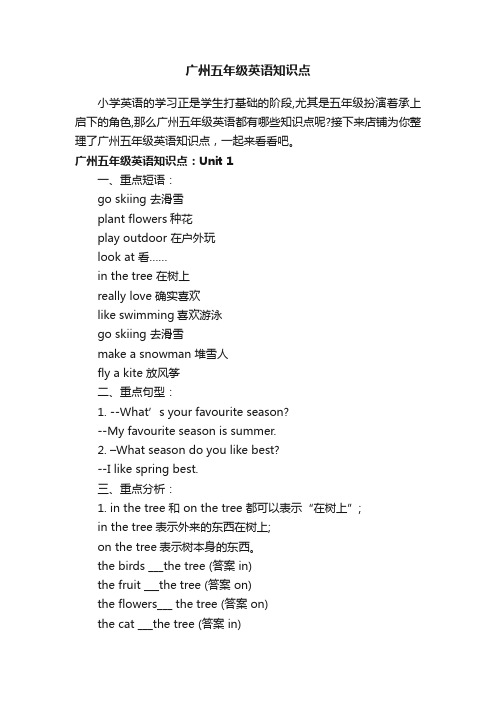
广州五年级英语知识点小学英语的学习正是学生打基础的阶段,尤其是五年级扮演着承上启下的角色,那么广州五年级英语都有哪些知识点呢?接下来店铺为你整理了广州五年级英语知识点,一起来看看吧。
广州五年级英语知识点:Unit 1一、重点短语:go skiing 去滑雪plant flowers种花play outdoor 在户外玩look at 看……in the tree 在树上really love 确实喜欢like swimming喜欢游泳go skiing 去滑雪make a snowman 堆雪人fly a kite 放风筝二、重点句型:1. --What’s your favourite season?--My favourite season is summer.2. –What season do you like best?--I like spring best.三、重点分析:1. in the tree 和 on the tree 都可以表示“在树上”;in the tree表示外来的东西在树上;on the tree表示树本身的东西。
the birds ___the tree (答案 in)the fruit ___the tree (答案 on)the flowers___ the tree (答案 on)the cat ___the tree (答案 in)2. the best time for swimming = the best time to swim[注意for 后面的动词要用ing形式,to 后面要用动词原形。
]When is the best time for visiting Beijng / to visit Beijing ?3. prefer表示对比,意思是“更喜欢;更愿意,宁愿;更倾向于…..”I don’t want to go out.I prefer to stay at home.4. either 用于否定句中,表示“也”,相当于肯定句或疑问句中的“too”。
广州版小学英语知识点总结
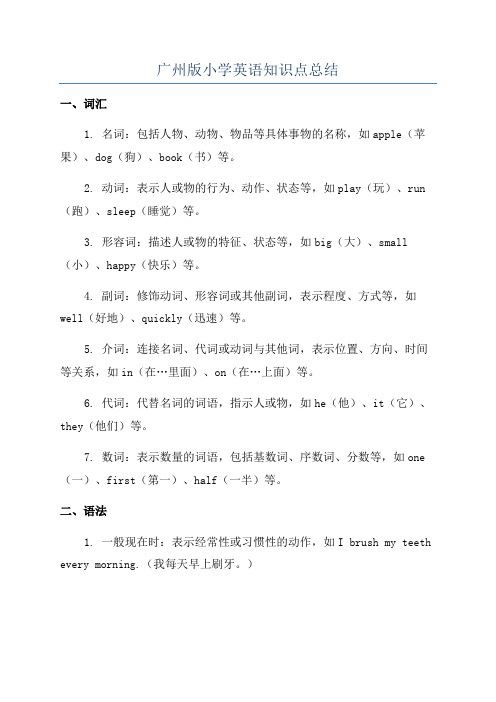
广州版小学英语知识点总结一、词汇1. 名词:包括人物、动物、物品等具体事物的名称,如apple(苹果)、dog(狗)、book(书)等。
2. 动词:表示人或物的行为、动作、状态等,如play(玩)、run (跑)、sleep(睡觉)等。
3. 形容词:描述人或物的特征、状态等,如big(大)、small (小)、happy(快乐)等。
4. 副词:修饰动词、形容词或其他副词,表示程度、方式等,如well(好地)、quickly(迅速)等。
5. 介词:连接名词、代词或动词与其他词,表示位置、方向、时间等关系,如in(在…里面)、on(在…上面)等。
6. 代词:代替名词的词语,指示人或物,如he(他)、it(它)、they(他们)等。
7. 数词:表示数量的词语,包括基数词、序数词、分数等,如one (一)、first(第一)、half(一半)等。
二、语法1. 一般现在时:表示经常性或习惯性的动作,如I brush my teeth every morning.(我每天早上刷牙。
)2. 疑问句和否定句:在句子中加入疑问词或助动词构成疑问句,如Does she have a pet?(她有宠物吗?)为动词加not构成否定句,如I do not like vegetables.(我不喜欢蔬菜。
)3. 一般过去时:表示过去发生的动作或存在的状态,如He played football yesterday.(他昨天踢足球。
)4. 有...的人或物:用“have/has”表达人或物具有其中一种特征或拥有其中一种东西,如I have a cat.(我有一只猫。
)5. 情态动词can:表示能力、许可或可能性,如He can swim.(他会游泳。
)6. 以...做为:用介词“as”表示对象具有其中一种特征或扮演其中一种角色,如He works as a doctor.(他以医生为职业。
)7. 形容词的比较级和最高级:用于比较两个或多个事物的大小、高低等,如She is taller than me.(她比我高。
新编广州版小学英语五年级下册语法

五年级下册语法后跟动词原形do/don't,does/doesn't,did/didn'tcan/can't,should/shouldn't,will/won't,wait to,be going to,I'd like to,plan to等动词后面跟动词原形如:1.I can't wait to there delicious foods now.A: enjoy B:enjoying C:enjoyed2.I think my mother will all right soon.A:is B:be C:was后跟动词ing形式以下动词后跟动词ing形式:1.am/is/are/was/were后跟动词ing形式2.两个动词放在一起时后面一个动词要用ing形式。
如:like playing; like swimming;love swimming.如:1.I am swimming. She is singing. We are running.He likes swimming. They love running.时态1.一般现在时句子中有频率动词sometimes/often/usually/always/seldom/every/never就用一般现在时。
如主语是第三人称单数(she/he/it/my father/my mother/Jiamin单独人名/the boy/the girl/the dog所有单数单词),动词加s或es;如主语不是第三人称单数(I//we/they/you/children/boys/girls所有复数单词)动词用原形。
如:She goes to school at 7:00 every. / My father often takesExercises at 6:30./We sometimes play football after school./They usually go to school at 7:20.2.现在进行时如句子中有单词: now/listen/look 就用现在进行时。
教科版(广州)小学英语五年级上册模块重点归纳
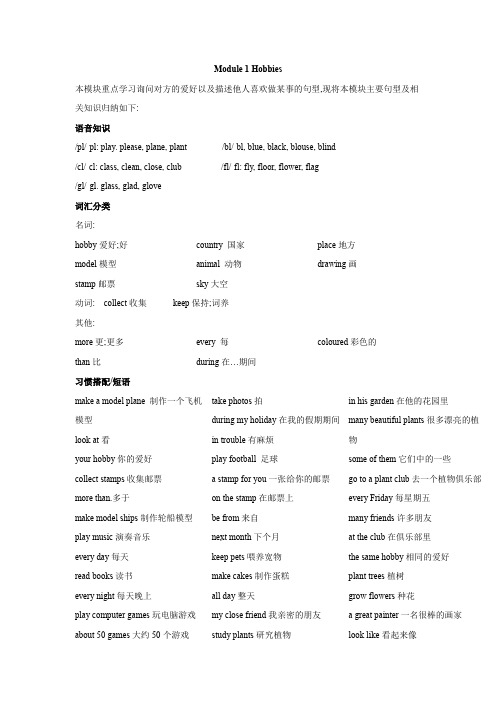
Module 1 Hobbies本模块重点学习询问对方的爱好以及描述他人喜欢做某事的句型,现将本模块主要句型及相关知识归纳如下:语音知识/pl/-pl: play. please, plane, plant /bl/-bl, blue, black, blouse, blind/cl/-cl: class, clean, close, club /fl/-fl: fly, floor, flower, flag/gl/-gl. glass, glad, glove词汇分类名词:hobby爱好;好model模型stamp邮票country 国家animal 动物sky大空place地方drawing画动词: collect收集keep保持;词养其他:more更;更多than比every 每during在…期间coloured彩色的习惯搭配/短语make a model plane 制作一个飞机模型look at看your hobby你的爱好collect stamps收集邮票more than.多于make model ships制作轮船模型play music演奏音乐every day每天read books读书every night每天晚上play computer games玩电脑游戏about 50 games大约50个游戏take photos拍during my holiday在我的假期期间in trouble有麻烦play football 足球a stamp for you一张给你的邮票on the stamp在邮票上be from来自next month下个月keep pets喂养宽物make cakes制作蛋糕all day整天my close friend我亲密的朋友study plants研究植物in his garden在他的花园里many beautiful plants很多漂亮的植物some of them它们中的一些go to a plant club去一个植物俱乐部every Friday每星期五many friends许多朋友at the club在俱乐部里the same hobby相同的爱好plant trees植树grow flowers种花a great painter一名很棒的画家look like看起来像draw cartoons画漫画draw animals画动物after school放学后in the sky在天空中birthday cards生日卡片beautiful places美丽的地方in every room在每一个房间里in her house在她家grow up长大write stories写故事play table tennis打乒乓球do some reading阅读very much很;非常put…on..把……放在…上in his bedroom在他的卧室里in the bag在袋子里as a hobby作为一项爱好惯用表达式Wow!哇! Thank you very much,非常感谢你。
广东五年级必考知识点英语
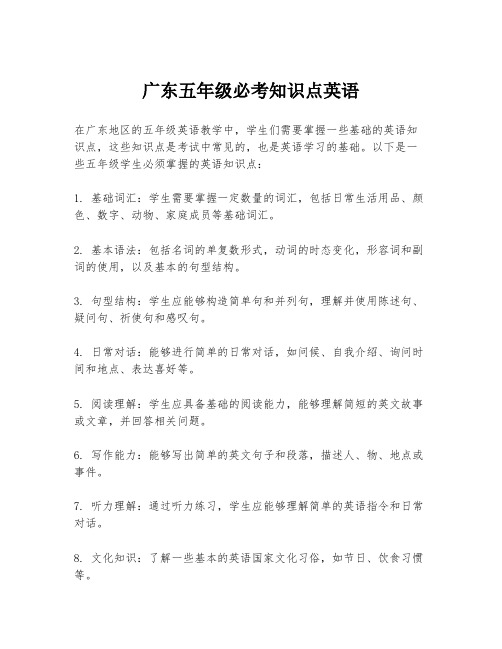
广东五年级必考知识点英语
在广东地区的五年级英语教学中,学生们需要掌握一些基础的英语知识点,这些知识点是考试中常见的,也是英语学习的基础。
以下是一些五年级学生必须掌握的英语知识点:
1. 基础词汇:学生需要掌握一定数量的词汇,包括日常生活用品、颜色、数字、动物、家庭成员等基础词汇。
2. 基本语法:包括名词的单复数形式,动词的时态变化,形容词和副词的使用,以及基本的句型结构。
3. 句型结构:学生应能够构造简单句和并列句,理解并使用陈述句、疑问句、祈使句和感叹句。
4. 日常对话:能够进行简单的日常对话,如问候、自我介绍、询问时间和地点、表达喜好等。
5. 阅读理解:学生应具备基础的阅读能力,能够理解简短的英文故事或文章,并回答相关问题。
6. 写作能力:能够写出简单的英文句子和段落,描述人、物、地点或事件。
7. 听力理解:通过听力练习,学生应能够理解简单的英语指令和日常对话。
8. 文化知识:了解一些基本的英语国家文化习俗,如节日、饮食习惯等。
9. 语音和发音:掌握英语的基本发音规则,能够正确发音单词和句子。
10. 词汇运用:能够在不同的语境中正确使用词汇,包括同义词和反
义词的运用。
结尾:
掌握这些知识点不仅能够帮助学生在考试中取得好成绩,更能为他们
的英语学习打下坚实的基础。
家长和老师应鼓励学生通过多种方式学
习英语,如阅读英文书籍、观看英语节目、参与英语角等,以提高他
们的语言运用能力。
记住,学习英语是一个长期的过程,需要持续的
努力和实践。
广州版英语五年级上册语法知识点总结
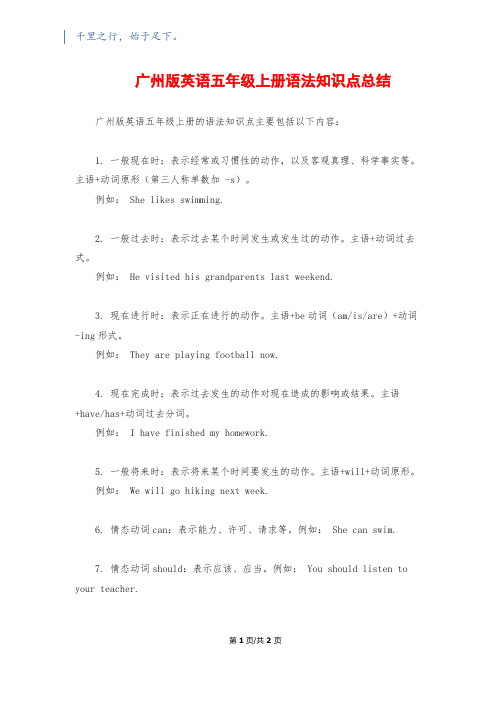
千里之行,始于足下。
广州版英语五年级上册语法知识点总结广州版英语五年级上册的语法知识点主要包括以下内容:1. 一般现在时:表示经常或习惯性的动作,以及客观真理、科学事实等。
主语+动词原形(第三人称单数加 -s)。
例如: She likes swimming.2. 一般过去时:表示过去某个时间发生或发生过的动作。
主语+动词过去式。
例如: He visited his grandparents last weekend.3. 现在进行时:表示正在进行的动作。
主语+be动词(am/is/are)+动词-ing形式。
例如: They are playing football now.4. 现在完成时:表示过去发生的动作对现在造成的影响或结果。
主语+have/has+动词过去分词。
例如: I have finished my homework.5. 一般将来时:表示将来某个时间要发生的动作。
主语+will+动词原形。
例如: We will go hiking next week.6. 情态动词can:表示能力、许可、请求等。
例如: She can swim.7. 情态动词should:表示应该、应当。
例如: You should listen to your teacher.第1页/共2页锲而不舍,金石可镂。
8. 基数词和序数词的用法。
例如: six cups,the first book。
9. 形容词的比较级和最高级形式。
例如: tall-taller-tallest,good-better-best。
10. 疑问词的用法。
例如: What's your favourite colour?11. 人称代词的主格和宾格。
例如: I like apples. Give it to me, please.12. 反意疑问句。
例如: You like Chinese food, don't you?13. 特殊疑问句。
广州版小学英语各年级主要知识点归纳
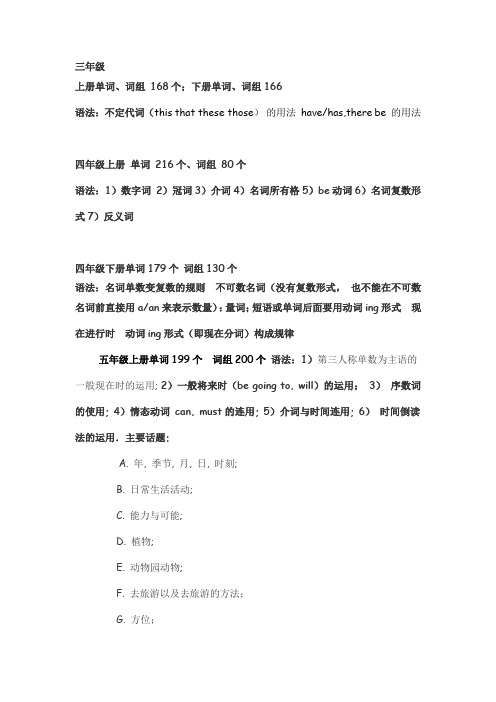
三年级上册单词、词组 168个;下册单词、词组166语法:不定代词(this that these those)的用法have/has,there be 的用法四年级上册单词 216个、词组 80个语法:1)数字词 2)冠词3)介词4)名词所有格5)be动词6)名词复数形式7)反义词四年级下册单词179个词组130个语法:名词单数变复数的规则不可数名词(没有复数形式,也不能在不可数名词前直接用a/an来表示数量):量词;短语或单词后面要用动词ing形式现在进行时动词ing形式(即现在分词)构成规律五年级上册单词199个词组200个语法:1)第三人称单数为主语的一般现在时的运用; 2)一般将来时(be going to, will)的运用; 3)序数词的使用; 4)情态动词 can, must的连用; 5)介词与时间连用; 6)时间倒读法的运用.主要话题:A. 年, 季节, 月, 日, 时刻;B. 日常生活活动;C. 能力与可能;D. 植物;E. 动物园动物;F. 去旅游以及去旅游的方法;G. 方位;H. 问路与应答;I. 规劝与应答五年级下册151个词组125个语法:1)掌握主语为第三人称单数一般现在时的各种句型2)学习和掌握should和shouldn’t的用法3)人称代词和物主代词的用语及正确使用4)形容词、副词的比较级的用法及构成4)I prefer…句型及待客用语的问答5)名词改为形容词的构词方法,如sun— sunny本册书有关于疾病、野生动物、食物等的名词及短语;有关于描述天气特征、人物状态、物体等的形容词还有动词和副词等。
(打电话、看病、询问、量度、用餐、天气)及相关的句型;六年级上册单词107个词组118个六年级下册单词140个词组130个语法:一般过去时;形容词的用法:形容词的比较级变化。
much +比较级;When 引导的时间状语从句--------用when连接前后两个完整的句子;There be句型;宾语从句;时间状语从句;年代的读法;选择疑问句;反意疑问句;连词(and,but,so)的用法;形容物体的形状、颜色、长相等;感叹句的学习;主语+ be 动词+ 形容词;形容词的比较级和最高级;时间表达;情态动词○1can/can’t + 动词原形could/couldn’t + 动词原形○2may/may not + 动词原形○3must/mustn’t + 动词原形(needn’t)Don’t + 动词原形禁止/不允许I hope/wish +句子(can/will/could/动词)我期望……(虚拟)。
教科版(广州版)英语五年级下册知识点总结

五年级下册知识点一、短语1. go skiing 去滑雪2. go camping 去露营3. play outside在户外玩4. fly a kite 放风筝5. make a snowman 堆雪人6. see/watch a film 看电影7. go shopping 去购物8. watch a football match 看足球比赛9. visit the museum 参观博物馆10. go mountain climbing 去爬山11. have a good time 玩得开心12. turn left/right 左转/右转13. go straight ahead 直走14. too…to 太。
以至于15. would you like…? 你愿意。
吗?16. I’d like to… 我想要。
17. get hurt 受伤害18. watch out 注意二、句型【M1】1. 问最喜欢的季节:- What’s your favourite season?- My favourite season is … .2. 问一年有多少季节:- How many seasons are there in a year?- There are four.3. 问在相应的季节做什么事:- What can you do in +季节?- I can do sth. in +season. ( e.g: I can make a snowman in winter.)4. 选择疑问句:- Do you like summer or winter?- I like summer/winter.- I don’t like summer, and I don’t like winter, either.【M2】1. 问计划或将要做什么:- What are you going to do tomorrow/this weekend…?- I am going to do sth. (+动词原形.)2. 问日期:(重点复习序数词和月份的表达)- What’s the date today?- It’s 月份+序数词. ( e.g: It’s June 1st.)3. 问星期几:- What day is it today?- It’s +星期几. ( e.g: It’s Monday.)【M3】1. 邀请:- Would you like to do sth.? (e.g: Would you like to go shopping?) - Yes, I’d like to. / That sounds great.2. 问约定时间:- What time should we meet?- At +时间.【M4】1. 问交通工具:- How do you do sth. ? / How will you get there?- By +交通工具. ( e.g: I go to school by bike.)【M5】祈使句的用法:(动词原形,don’t表示否定)1. -Do cross the street at the traffic lights or safety crossing.- Ok. / All right.2. Don’t cross the road when the traffic light is red.【M6】1. 问路:- Excuse me. Can you tell me the way to …?- Yes. Go straight ahead. Turn left/right at the second crossing.三、语法1. 一般现在时(经常做、习惯)a. 标志词:often, always, never, usually, seldom, sometimes, everyb. 形式/结构:肯定句:第一、二人称、复数+动词原形;第三人称单数+动词s/es 否定句:第一、二人称、复数+ don’t +动词原形;第三人称单数+ doesn’t +动词原形一般疑问句:Do + 第一、二人称、复数+ 动词原形+ 其他?Does + 第三人称单数+ 动词原形+ 其他?2. 一般将来时a. 标志词:tomorrow, next week/month/…, 将来时间b. 肯定句形式/结构:①主语+ will + 动词原形(e.g: I will go to school tomorrow.)②主语+ be going to +动词原形(be动词:am, are, is)e.g: She is going to go to the library this weekend.3. 一般过去时a. 标志词:yesterday, last, ago, 过去时间b. 形式:主语+ 动词过去式(一般+ed)+ 其他.1、只要朝着一个方向努力,一切都会变得得心应手。
广州版小学英语语法

广州版小学英语语法篇一:广州小学英语语法一、名词复数规则1.一般情况下,直接加-s,如:book-books, bag-bags, cat-cats, bed-beds2.以s. x. sh. ch结尾,加-es,如:bus-buses, box-boxes, brush-brushes, watch-watches3.以“辅音字母+y”结尾,变y为i, 再加-es,如:family-families, strawberry-strawberries4.以“f或fe”结尾,变f或fe为v, 再加-es,如:knife-knives5.不规则名词复数:man-men, woman-women, policeman-policemen, policewoman-policewomen, mouse-mice child-childrenfoot-feet,.tooth-teethfish-fish, people-people, Chinese-Chinese, Japanese-Japanese写出下列各词的复数I _________him _________this ___________her ______watch _______child _______photo ________diary ______day________ foot________ book_______ dress ________tooth_______ sheep ______box_______ strawberry _____thief _______yo-yo ______ peach______ sandwich ______ man______ woman_______ paper_______ juice___________water________ milk________ rice__________tea__________二、一般现在时一般现在时基本用法介绍【No. 1】一般现在时的功能1.表示事物或人物的特征、状态。
广州版小学五年级英语知识点总结
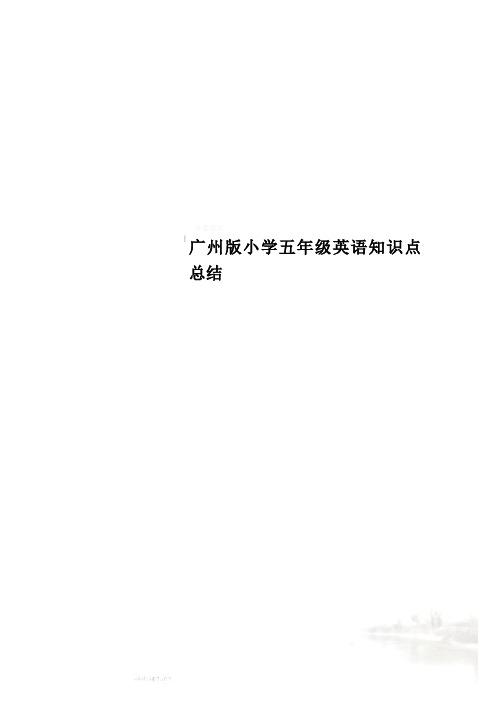
广州版小学五年级英语知识点总结广州版小学五年级英语知识点总结五年级上册共六个模块,18单元,209单词(四年级186个单词)五年级下册共六个模块,18单元,157单词(四年级172个单词)五年级上册知识点Module1 Routines and Dates学习重点1、掌握一月到十二月、四季的名称2、用英语说出日期日期的表示法有两种,如:“今天10月20日。
”a)先说月份:Today is October the twentieth (20th)b)先说日期:Today is the twentieth of October(20th)3、掌握节日的名称及日期。
(详见书本第13页)例如:New Year's Day( January 1st ) Women's Day( March 8th)4、能用英语说出学期的开始和结束The autumn term begins in September and ends in January.5. 掌握基数词和序数词,注意区分和运用重点掌握:first,second,third,fifth,ninth,twelfth,twentieth.基数词表示数量:three pandas三只熊猫。
序数词表示顺序:the second month第二个月6、注意表示时间频率的词:never、sometimes、often、usually、always,注意这些词在句子中的位置——除了“是”动词以外,他们都放在在动词的前面,如:(1)She often comes here . (2)She is always late .7、能用英语谈论日常的活动(能写一篇小作文)He can’t skate at all .=He can not skate at all.He doesn’t like it at all .=He does not like it at all.Module 3 Plants学习重点1、能用英语说出一些植物(花,树木)的名称,并能写出十个以上有关植物的单词,并写上中文。
广州版五年级第一单元重点语法点

当主语是第三人称单数时,一般现在时的动词要变一般现在时第三人称单数的形式,动词原形变一般现在时第三人称单数形式的规律为:1. 一般情况加-s,如:work- works, read- reads, play- plays;2. 以s, x, sh, ch 结尾和部分以o结尾的单词加-es, 如:brush- brushes, watch-watches, go- goes;3. 以辅音字母y结尾的单词,改y为i加-es,如:study- studies, carry- carries;4. 特殊变化,如:have- has.以下为主语是第三人称单数时的例句:He gets up at six.She brushes her teeth after breakfast.He goes to work at seven.My cousin studies hard.一般现在时表示现在的情况或经常发生的动作,其肯定句变为否定句、一般疑问句和特殊疑问句的情况如下:1. He has dinner at six. (肯定句)He doesn't have dinner at six. (否定句)Does he have dinner at six? (一般疑问句)When does he have dinner? (特殊疑问句)2. My sister cleans the room every day. (肯定句)My sister doesn't clean the room every day. (否定句)Does your sister clean the room every day. (一般疑问句)Who cleans the room every day? (特殊疑问句)以下是三组相反意义的表示时间频度的词:always—never usually---- seldom (极少) often--- sometimes注意这些词常用在行为动词前和be动词的后面,例如:He often comes here.He is always late基数词表示数目,序数词表示顺序,把基数词改为序数词的规律是:1. 在基数词后加-th,如:four—fourth, six—sixth, seven—seventh, eleven—eleventh, eighteen--eighteenth2. 以ty结尾的基数词,改y为i加eth, 如:twenty—twentieth, thirty—thirtieth, forty--fortieth3. 不规则变化:one—first, two—second, three—third, five—fifth, eight—eighth, nine—ninth, twelve-- twelfth序数词的缩写形式是阿拉伯数字后加序数词的最后两个字母,如:first ---- 1st, second---- 2nd, third---- 3rd, fourth---- 4th, twentieth--- 20th,twenty-first---------- 21st, twenty-second-------- 22nd, twenty-third------23rd,twenty-fourth---------24th月份的缩写为:January--- Jan. February--- Feb. March--- Mar.April--- Apr. June--- Jun. August--- Aug.September---Sep. October--- Oct. November--- Nov.December--- Dec.下面介绍两种日期的表示方法:1. 月份+ 序数词+ 年份,如:August the eighth,20082.序数词+ of + 月份+ 年份,如:the first of October,1949介词与时间的搭配:1. 表示时刻用at,如:at nine o'clock, at ten thirty2. 表示日期或一天的一部分用on,如:on Sunday, on September 10th, onMonday morning3. 表示月份用in,如:in March, in December4. 表示季节用in,如:in spring, in winter5. 表示年份用,如:in 1999, in 2008About的两种意思:1. 大约。
广州五年级上英语知识点

广州五年级上英语知识点广州的五年级英语课程通常遵循国家教育大纲,结合地方特色,为学生提供全面的英语学习体验。
以下是一些可能包含在五年级上学期英语课程中的知识点:1. 词汇积累:- 学习日常生活相关的词汇,如家庭成员、学校用品、食物、动物等。
- 掌握基本的形容词和动词,用以描述事物特征和行为。
2. 基本句型:- 学习并运用简单句型,如陈述句、疑问句、祈使句等。
- 练习使用“be动词”和助动词构成的句型。
3. 语法知识:- 掌握名词的单复数变化。
- 学习动词的时态,如现在进行时、一般现在时、一般过去时等。
4. 阅读理解:- 阅读并理解简单的英语短文,提取关键信息。
- 练习通过上下文推测生词的意思。
5. 口语交际:- 练习日常英语对话,如问候、自我介绍、询问和回答等。
- 学习使用礼貌用语和表达感谢。
6. 写作技能:- 练习写简单的句子和段落,如日记、书信等。
- 学习使用基本的连接词,使文章更加连贯。
7. 文化知识:- 了解英语国家的节日和习俗。
- 学习英语国家的一些基本地理和历史知识。
8. 综合运用:- 通过角色扮演、情景对话等活动,将所学知识综合运用到实际语境中。
- 完成一些简单的英语项目,如制作海报、编写小故事等。
9. 学习策略:- 学习有效的记忆词汇的方法,如联想记忆、分类记忆等。
- 培养自主学习的习惯,如定期复习、主动查阅资料等。
通过这些知识点的学习,学生不仅能够提高英语语言技能,还能培养跨文化交流的意识和能力。
同时,教师应鼓励学生积极参与课堂活动,通过实践来巩固所学知识。
希望这些内容对广州五年级的学生有所帮助。
广州英语五年级知识点
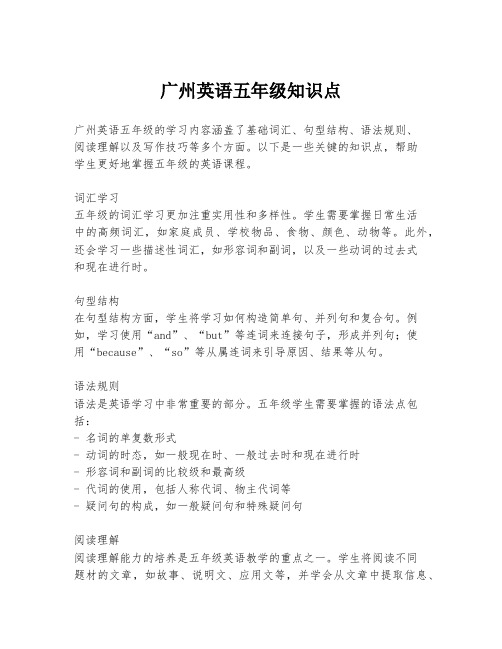
广州英语五年级知识点广州英语五年级的学习内容涵盖了基础词汇、句型结构、语法规则、阅读理解以及写作技巧等多个方面。
以下是一些关键的知识点,帮助学生更好地掌握五年级的英语课程。
词汇学习五年级的词汇学习更加注重实用性和多样性。
学生需要掌握日常生活中的高频词汇,如家庭成员、学校物品、食物、颜色、动物等。
此外,还会学习一些描述性词汇,如形容词和副词,以及一些动词的过去式和现在进行时。
句型结构在句型结构方面,学生将学习如何构造简单句、并列句和复合句。
例如,学习使用“and”、“but”等连词来连接句子,形成并列句;使用“because”、“so”等从属连词来引导原因、结果等从句。
语法规则语法是英语学习中非常重要的部分。
五年级学生需要掌握的语法点包括:- 名词的单复数形式- 动词的时态,如一般现在时、一般过去时和现在进行时- 形容词和副词的比较级和最高级- 代词的使用,包括人称代词、物主代词等- 疑问句的构成,如一般疑问句和特殊疑问句阅读理解阅读理解能力的培养是五年级英语教学的重点之一。
学生将阅读不同题材的文章,如故事、说明文、应用文等,并学会从文章中提取信息、理解主旨大意以及做出推理判断。
写作技巧写作是表达思想的重要方式。
五年级学生将学习如何写日记、书信、故事等不同类型的文章。
在写作过程中,学生需要学会如何组织文章结构,使用恰当的时态和语态,以及如何进行有效的段落划分。
听力训练听力是语言学习中不可或缺的一部分。
学生将通过听英语故事、对话、歌曲等来提高听力理解能力。
同时,听力练习也有助于学生更好地掌握语音和语调。
口语表达口语能力的培养同样重要。
学生将通过角色扮演、小组讨论、演讲等活动来锻炼口语表达能力。
此外,学生还需要学会在不同场合使用恰当的语言和表达方式。
总结五年级的英语学习是一个全面提升的过程,不仅需要掌握基础知识,还要培养听说读写的综合能力。
通过不断的练习和应用,学生可以逐步提高英语水平,为将来的深入学习打下坚实的基础。
广州版英语五年级上册语法知识点总结
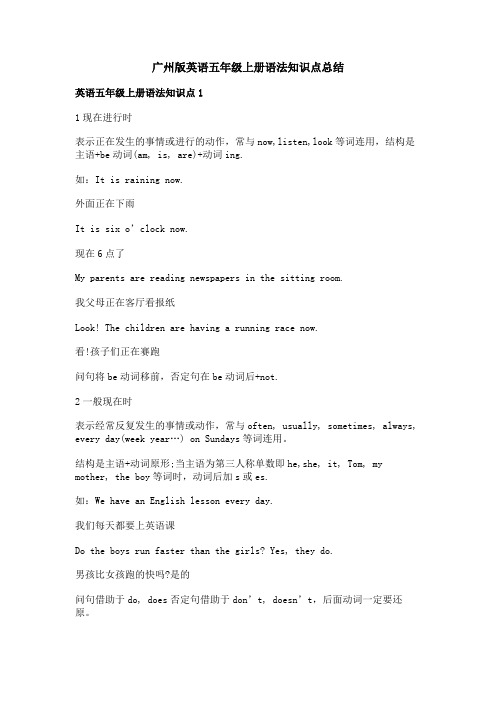
广州版英语五年级上册语法知识点总结英语五年级上册语法知识点11现在进行时表示正在发生的事情或进行的动作,常与now,listen,look等词连用,结构是主语+be动词(am, is, are)+动词ing.如:It is raining now.外面正在下雨It is six o’clock now.现在6点了My parents are reading newspapers in the sitting room.我父母正在客厅看报纸Look! The children are having a running race now.看!孩子们正在赛跑问句将be动词移前,否定句在be动词后+not.2一般现在时表示经常反复发生的事情或动作,常与often, usually, sometimes, always, every day(week year…) on Sundays等词连用。
结构是主语+动词原形;当主语为第三人称单数即he,she, it, Tom, my mother, the boy等词时,动词后加s或es.如:We have an English lesson every day.我们每天都要上英语课Do the boys run faster than the girls? Yes, they do.男孩比女孩跑的快吗?是的问句借助于do, does否定句借助于don’t, doesn’t,后面动词一定要还原。
3一般过去时表示发生在过去的事情或存在的状态,常与just now; a moment ago; … ago; yesterday; last ( week; month; year; Monday; weekend); this morning等词连用。
结构是主语+be动词的过去式(was; were)或主语+动词的过去式。
注意:be动词与动词过去式不可同时使用。
如:My earphones were on the ground just now.我的耳机刚刚还在呢。
广州版五年级英语下册重要考点归纳

五年级英语下册重要考点Unit 1. What ’s your favourite season?1. in the tree (外来物在树上) on the tree (长在树上)2. the best time to + V 原 the best time for +V-ing/名词3. I don ’t like summer, and Idon’t like winter , either. too (用于肯定句)“也”either (用于否定句)also -------------------- 放句中4. go skiing (去滑雪) go skating (去溜冰)5. prefer 更喜欢(用于两者之间做选择)6. --What ’s your favourite season? 你最喜欢的季节是什么? 答:My favourite season is +季节.● Season (季节):spring(春), summer(夏), autumn(秋), winter(冬) ● Month (月份):January, February, March, April, May, June,July, August, September, October, November, DecemberUnit 2. It ’s the middle of winter 1. in the middle of …在…的中间/中期eg: The park is in the middle of the city. 这座公园在城市的中间。
2. say to sb. 对某人说3. He is visiting me for the summer holidays. for 表示原因,由于在放假,所以来看我。
4. How do you have a summer holiday? (how 表示怎么、怎样)5. I am from Astralia. ( be from = come from 来自) eg: I am from China. = I come from China.6. too …to …(+V 原) 太…以致不能… eg: It ’ s too cold to swim now.7. What’s summer like in Australia? 澳大利的夏天怎么样?(问天气)What’s …like? …怎么样?形容天气的形容词:hot, cold, warm, cool, wet, dry, windy, sunny, snowy, rainyUnit 3. We are going to have anEnglish test1. 问日期:--What’s the date today? --It’s +日期.2. 问星期:-- What day is it today? --It’s +星期.3. 日期的表达:月份+the+序数词June the 23rdthe +序数词+of+月份the 23rd of June (写法:June 23rd)4.基数词变序数词5. on+具体日期/星期(的早上、下午、晚上)Eg : on June 11th, on the morning of June 11th ,on Monday, on Monday afternoon6.Is there anything else important next month?Is there问,there is 答。
广州小学英语语法归纳总结

广州小学英语语法归纳总结一、名词名词是指表示人、事物、地点、抽象概念的名称。
在句子中可以充当主语、宾语、表语等。
名词分为可数名词和不可数名词两种。
1. 可数名词可数名词有单数和复数两种形式。
单数表示一个,复数表示多个。
复数形式的构成方式包括直接在名词后加s,以及根据一定规则变化。
2. 不可数名词不可数名词只有单数形式,表示不能用来计数的名词,如水、牛奶等。
不可数名词通常没有复数形式,不可数名词前不能使用a/an,而可用some、a bottle of等表示数量。
3. 名词所有格名词所有格表示所属关系,可通过在名词末尾加's来构成所有格形式。
二、代词代词是用来代替名词的词语,可以在句子中充当主语、宾语、宾语补足语等。
1. 主格代词主格代词作为句子的主语时,常常出现在句首,包括I、you、he、she、it等。
2. 宾格代词宾格代词作为句子的宾语时,出现在动词或介词的后面,包括me、you、him、her、it等。
3. 物主代词物主代词用来表示所属关系,包括my、your、his、her、its等。
4. 反身代词反身代词用于强调动作的发出者与承受者是同一个人或物,包括myself、yourself、himself、herself、itself等。
三、动词动词用来表示做、行动或状态的词语,可以分为实义动词和助动词两种。
1. 实义动词实义动词指明具体的动作或状态,可以根据时态的不同进行变化。
2. 助动词助动词用来帮助主要动词构成时态、语态等,如be动词、do动词、have动词等。
四、形容词形容词用来描述名词或代词的特征或性质,一般位于名词之前。
1. 比较级形式形容词的比较级形式用于比较两个人或事物之间的差异,通常在形容词后加-er。
2. 最高级形式形容词的最高级形式用于表示三个或三个以上人或事物之间的比较,通常在形容词前加the并在后面加-est。
五、副词副词用来修饰动词、形容词、其他副词或整个句子,用于表示时间、地点、程度、方式等。
广州版五年级下英语语法专练

五年级下册英语语法专练代词专项练习1. Open the door for (I, me) please.2.Catch (he, him)! He’s a thief.3. (I ,my,me)love Mickey very much. What about (you, your)?4. (They, Them,their) are my classmates.5. Look at (they, them). They are drawing pictures.6. Are these oranges (their, theirs)?7. The blue bike is (her, his), not mine.8. Look at the car. (It’s, Its) colour is black.9. Your bags are green (their, theirs) are yellow.10.Their school is in the country. (Our, Ours) school is in the city.形容词的比较级和最高级的专项练习1. Fred is the (short ) in his class .2. My book is ( new ) than my sister's .3. That piece of chicken is the ( heavy ) in the fridge .4. The leopard can run ( fast) , but the cheetah can run ( fast) than it .It can run ( fast ) in the world .5. This zoo is much (good ) than the old one .6. The woman is the ( fat ) of the three .7. Who jumps (high ) , a kangaroo or a monkey ?8、Pizza is(delicious)than hamburgers.9、The new queen is beautiful,but Snow White is(beautiful) than the new queen.Snow White is the girl in the world.10、It is today than yesterday.(冷得多)一.根据句意填入单词的正确形式1.My brother is two years _________ (old) than me.2. Is your sister _________ (young) than you? Yes,she is.3. Who is __________ (thin),you or Helen? Helen is.4. Whose pencil-box is _________ (big),yours or hers? Hers is.5.Ben jumps ________ (high) than some of the boys in his class.6.Does Nancy sing __________ (well) than Helen? Yes, she does.7.My eyes are __________(big) than hers.8.Which is __________ (heavy),the elephant or the pig?9.Who gets up ________ (early),Tim or Tom?10.Do the girls get up_______(early) than the boys? No,they______.二、根据中文意思,把句子补充完整。
广州版五年级上下册英语知识点总结.doc
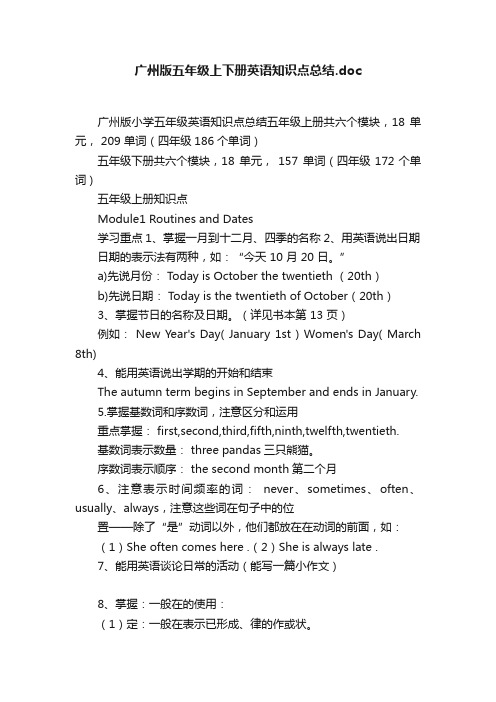
广州版五年级上下册英语知识点总结.doc广州版小学五年级英语知识点总结五年级上册共六个模块,18 单元, 209 单词(四年级186个单词)五年级下册共六个模块,18 单元,157 单词(四年级172个单词 )五年级上册知识点Module1 Routines and Dates学习重点1、掌握一月到十二月、四季的名称2、用英语说出日期日期的表示法有两种,如:“今天 10 月 20 日。
”a)先说月份: Today is October the twentieth (20th)b)先说日期: Today is the twentieth of October(20th)3、掌握节日的名称及日期。
(详见书本第 13 页)例如: New Year's Day( January 1st ) Women's Day( March 8th)4、能用英语说出学期的开始和结束The autumn term begins in September and ends in January.5.掌握基数词和序数词,注意区分和运用重点掌握: first,second,third,fifth,ninth,twelfth,twentieth.基数词表示数量: three pandas三只熊猫。
序数词表示顺序: the second month第二个月6、注意表示时间频率的词:never、sometimes、often、usually、always,注意这些词在句子中的位置——除了“是”动词以外,他们都放在在动词的前面,如:(1)She often comes here .(2)She is always late .7、能用英语谈论日常的活动(能写一篇小作文)8、掌握:一般在的使用:(1)定:一般在表示已形成、律的作或状。
(2)特征:通常句子中有often、 usually、或 sometimes等等。
(3)肯定句的构:人称 +:①其他人称( I、you、we、they、 the boys??) +原形②第三人称数( he、she、it 、T om、??)+“ s/es”形式例句: The boys like TV plays.Sally likes TV plays.(4)一般疑句:助(Do/Does)+人称 +原形Do the boys like TV plays? Does the boy like TV plays?(5)否定句:人称 +助否定形(don’ t/doesn’ t)+原形The boys don’ t like TV plays.The boy doesn’t like TV plays.(6)住:助一出,后面用原形。
- 1、下载文档前请自行甄别文档内容的完整性,平台不提供额外的编辑、内容补充、找答案等附加服务。
- 2、"仅部分预览"的文档,不可在线预览部分如存在完整性等问题,可反馈申请退款(可完整预览的文档不适用该条件!)。
- 3、如文档侵犯您的权益,请联系客服反馈,我们会尽快为您处理(人工客服工作时间:9:00-18:30)。
小学英语五年级(上)复习摘要Module 1短语:go to work do some reading surf the Net go for a walk take exercise句型:1.Would (you)like to + 动词原形。
意为“想要做……”肯定回答为:Yes, I’d like to. 否定回答为:No, thank you.例子:Would you like to _____ (go)to school with Yongxian tomorrow, children?ually表示“经常,通常”,是一般现在时的标志性词语。
一般现在时的标志性词语还有sometimes, often.也就是说一般看到这些词语都要用一般现在时时态。
例子:I usually get up at 8 o’clock. She usually _____(go) to school by bus.3. -----What are these (those)? / What is this (that)?-----They are……/ It is……4.How often(多久,多长时间) How many/much(多少) How old(多大,对年龄进行提问)例子:How often do you watch TV? / How often_____(do) Li Hong watch TV?短语:on holiday Children’s Day Teachers’ Day next to…go shopping fall asleep句型:1.How many_____(term) are there in your school year? 你们一学年共有多少个学期?2. -----When does the autumn term start?-----It starts in_____ and ends in_____ (注意月份的首字母要大写)Wh开头的疑问词:where who what which whose why介词:用at/on/in填空_____8 o’clock _____summer _____the weekend _____weekdays _____holiday _____September_____ the first day _____Monday _____January 1st_____London单元语法:一般现在时的构成:第三人称单数要在词尾加-s/-es1.一般情况下加-s 例:eat-eats, work-works2.在s, sh, ch, o 后面加-es 例:dress-dresses, wash-washes, teach-_____ go-_____3.以“辅音字母+y”结尾的动词,先变Y为i再加-es 例:carry-carries, fly-_____一般现在时变为否定式:当动词为实义动词时:在动词前加上don’t或doesn’t当动词为be动词时:直接在be动词后面加 not一般现在时变为疑问式:当动词为实义动词时:用do或does来提问当动词为be动词时:用am/are/is 来提问例子:I/You work here. I/You don’t work here. Do I/you work here?练习:He/She works here例子:I am a student. I am not a student. Am I a student?练习:We are students.Module 2短语:faster than…stand by…both of …句型:I can jump and I can swim.(can为情态动词,否定式是can not, 缩写为can’t)当疑问句中用can来提问时,肯定回答为yes, I can否定回答为No, I _____ 例句:----Can you sing? ----yes, _____./ No, _____翻译:我不会游泳,但我可以飞的非常高。
句型:Everyone has his own gift.Everyone表示“每个人,人人”当它做主语的时候,谓语动词用单数注意:everyone是一个词,只能用来指人,后面不能跟介词of。
every one 是两个词,既可以指人也能指物。
后面可跟介词of.短语:very well from morning till night句型:----How well can you dance? ----I can dance well/very well/quite well/not very well句型:What else can you do?单元语法:1.比较级和最高级的构成:(见课本)2.比较级的用法:两级事情相比较,用比较级+than 的结构翻译:这个男孩比那个女孩高3.最高级的用法:三者或三者以上相比,表示最高程度时,用the + 最高级翻译:他是班里最用功的学生需掌握的几个形容词的比较级,最高级:high, good, quick, old, young, longer, short….Module 3短语:of course take photos take a rest line up排队take care of put back把。
放回原处city flower句型:Can I +动词原形?,表示请求”我可以…”例句:----Can I go with you / help you/ take the camera?----sure/ of course句型:Let’s go to the flower show. Let’s表示“让我们。
吧”翻译:让我们做个游戏吧。
句型:what are you doing there? 现在进行时be+doing句型:Are you ready? (Be ready to …意为“准备好干什么了”)翻译:你准备好吃饭了吗?句型:---They look like cups, don’t they?他们看起来像茶杯,不是吗?---Yes, they do 是的,像茶杯这个一个反义疑问句,如果前一部分是肯定形式,后一部分一般用否定;如果前一部分是否定,后一部分一般用肯定。
两部分的人称和时态要一致.回答时如果事实是肯定的就用yes,否则用No例子:The bus is late, isn’t it?The girl didn’t go home late yesterday, _____ she?Module 4短语:by plane, leave for, half past seven, a quarter to ten, stay with, on foot, on Monday,Window of the world, a day trip, go home, at home, Night Zoo, shopping centre, get to,take cable car句型:be going to+ 原型,表示“打算…”一般将来时1. How are you going(to get) there? 你打算怎么去那儿?(对方式,方法进行提问)By bus/ plane2. Where are you going on holiday? 你打算去哪里度假呢?I am going to Hong Kong3. What time is your train going to leave for Hong Kong? 你们的火车将什么时候开往香港呢?At a quarter to ten/8 o’clock句型: When will you get there? 你将什么时候到那儿?句型:What are you going to do?句型:What about …这一句型用于提出建议,意为“…怎么样?”例句:What about going to the cinema?单元语法:一般将来时基本用法:一般将来时常和表将来的时间连用,如:tomorrow, next week , next month,Next year, in a few days等1.一般将来时由助动词shall或will加动词原形构成。
Shall 用于第一人称,will用于二,三人称2.一般将来时还可以用 be going to + 动词原形例句: He will come next weekI am going to attend a meeting.Module 5短语:fall off, no more, too near, two by two两个两个地, get into… , get out, wake up, laugh at句型:stand up! /sit down/ open the door有没有发现什么规律呢?祈使句:动词原形+ 主语(否定形式只需要在前面加上Don’t)Don’t forget!/Don’t be late!句型:Where is the lion from?这头狮子来自哪里?如果想问某人来自哪里,可以用以下几种说法:1. Where do you come from? I come from…2. Where are you from? I am from…3. Which country do you come from? From…Module 6短语:by the way, have a look, straight ahead, train station, police station, post office, TV station句型:掌握怎样问题或怎样给别人指路。
相关句型有:----Excuse me. Could you tell me the way to …, please?---- Yes, go straight…/ turn right out of …/ take the …left----Is … near here?----Thank you very much----You are welcome.单元语法:基数词:●1~12:one…twelve●13~19:加后缀-teen: thirteen, fourteen, fifteen●20~90等整十数加后缀-ty: twenty, thirty●表示几十几,个位数和十位数之间必须有连字符:twenty-one, forty-six序数词:➢第一至十九的序数词一般由基数词加-th构成,前三个是特殊的:first second third fourth fifth six th seven th eigh th…nineteen th ➢以-ty结尾的整十的据数次变为序数词时,先将Y变为i,再加上-eth:twentieth fortieth thirtieth➢21以上的多为数,只将末尾数变为序数词,前面的其他位数仍用基数词:twenty first五年级英语(下册)重要知识点梳理【教学目标】1. “四会”:large, needn’t, more, more than, bright, pupil, thousand, ours, his, hers, better, theirs, country, language, tidy, have, hard, mine, its.2.能运用形容词和副词比较级的句子于语言实践中。
